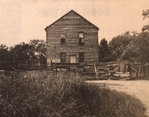
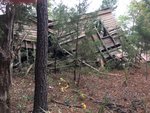
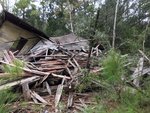
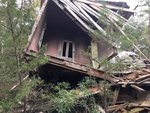
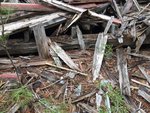
The Jacksonboro Masonic Lodge where the S.C. Assembly met in 1782 has now collapsed.
Another Colleton County historic landmark, the Masonic Lodge originally in Jacksonboro, has collapsed due to neglect.
On Jan. 8, 1782, Jacksonboro was on the map — two years before Walterboro was settled in 1784.
The S.C. General Assembly met in the small village: 13 members of the S.C. Senate in a tavern remodeled for the occasion and 74 members of the S.C. House of Representatives in the Jacksonboro Masonic Lodge.
According to a story in The Press and Standard by local historian Beulah Glover on March 11, 1976, Gov. John Rutledge called the 1782 General Assembly meeting. Senators and representatives were housed in plantation homes.
There were no public buildings then. The courthouse and jail were not built until the 1800s. So, a tavern operated by Peter Dubose was rented and a partition removed to accommodate the Senate members, and the Masonic Lodge was used for the House members’ meeting.
Of the 28 senators and 174 representatives at the time, only 13 Senate members and 74 House representatives attended — many had not yet returned home from being prisoners of war of the British during the Revolutionary War, including Henry Laurens, who was jailed in the Tower of London. But a quorum attended, allowing the General Assembly to conduct its work.
They met until late February. Assembly business included classifying the Tory-occupied plantations be returned to their owners under the Confiscation Act.
The Masonic Lodge building remained standing in Jacksonboro until the early 1900s, when it was moved twice: first to Ravenel and then to Meggett. Former Meggett Mayor W.B. Searson said he attended the first grade in the building in 1922. The building was moved to Meggett by Dan Towles and was later renovated as a home.
But the building that held such a prominent place in the state’s history came to a sad end in 2020. In early November, Colleton County Historical and Preservation Society members Emily and Charles Bridges of Round O decided to try to track down the Jacksonboro Lodge, thinking the building might be salvable and returned to its original home.
However, they discovered that while the building was still in Meggett, it had collapsed in the previous weeks prior to their visit.
JACKSONBORO HISTORY
Jacksonboro was originally named Pon Pon, an Indian settlement. The town took its name from John Jackson, who was granted a tract of land along the Edisto River in 1701.
By 1735, Jacksonboro was recognized as a settlement with planters building winter homes along the river. A plan in 1780 shows land laid out in 113 town lots, each with 100-feet of frontage by 218 feet deep. Streets were named King, Market and Boundary.
Jacksonboro became the county seat from 1788-1822 with a courthouse and jail until the courthouse and jail in Walterboro were completed.
The town had the first free school and an early race track. The first churches (Episcopal and Presbyterian) were built nearby. And the first Masonic lodge was located here.
The town’s biggest moment was when Gen. Nathaniel Greene arranged for the S.C. General Assembly to meet in Jacksonboro during the Revolutionary War. Charleston was under siege, so he chose Jacksonboro because he could better protect the Assembly there.
The Assembly met for 40 days in January and February 1782 at the Masonic lodge and a tavern owned by Peter DuBose.
And for a season, Jacksonboro was the provisional capital of South Carolina.
The economy was boosted in the 1880s by phosphate mines owned by F.C. Fishburne.
A post office was established there on Feb. 23, 1823. Just after July 1869, the spelling of the name of the town was changed to Jacksonborough, then changed back to Jacksonboro on Nov. 28, 1892.